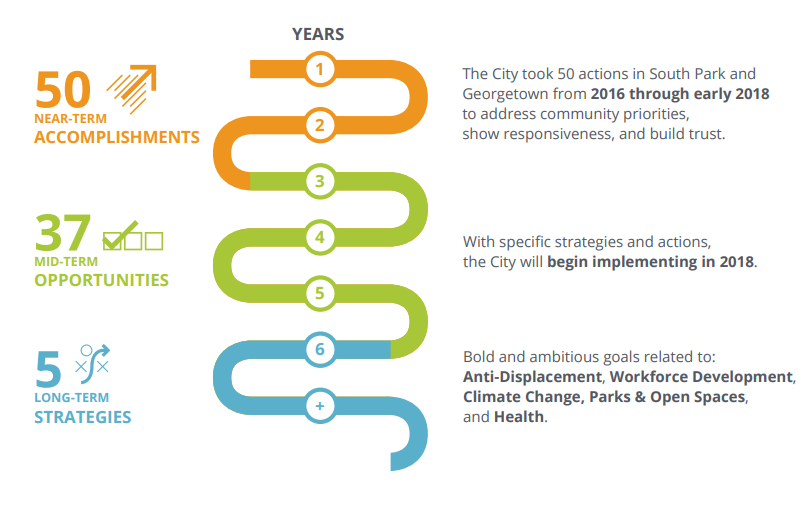A sustainable city is one is where all residents have equal opportunity to thrive and prosper, where health outcomes are consistent across all community, racial, and ethnic groups, and environmental benefits are shared equally by everyone. In Seattle, we are committed to sustainability excellence by developing and advancing the next generation solutions in partnership with the community we serve.
Seattle has long been recognized as being at the vanguard of environmental progress. Our municipal electric utility was the first large utility in the U.S. to achieve carbon neutrality, our recycling rates continue to be amongst the highest in the nation, and we are ahead of schedule to meet our goal of having 30 percent of all new vehicles in Seattle be electric by 2030.
There are myriad opportunities for cities to lead when it comes to environmental sustainability; Seattle is proud that much of our leadership has come from our community members identifying their own environmental priorities and solutions.
Three years ago, Seattle launched the Equity & Environment Initiative, a first of its kind effort that formally acknowledged that not all Seattle residents benefitted from our environmental progress equally. Communities of color, immigrants, refugees, people with low-incomes, and limited-English proficiency individuals have long been burdened by environmental injustices while primarily white, upper income communities have benefitted. While Seattle proudly stands behind our environmental accomplishments to date, we also recognize that we must do better.
One of the areas with the most staggering environmental disparities is Seattle’s Duwamish River Valley. The Duwamish Valley is home to approximately 5,600 people and numerous businesses and industries. The neighborhoods in the Duwamish Valley are resilient, close-knit communities that are bound together by intimate social and cultural ties.
Duwamish Valley communities have experienced documented inequities for years. In addition to being home to a Superfund site—a polluted location requiring a long-term response to clean up hazardous material contaminations—these communities face many other stressors and have experienced less investment of City services and projects. Exposure to air pollution, noise pollution, and highways is higher in the Duwamish Valley than the city average and the distribution of environmental benefits such as access to open space and access to healthy and culturally preferred food is considerably lower. The hospitalization rates for asthma in the Duwamish Valley are the highest in the county. The Duwamish Valley is also an area subject to flooding, which is projected to increase due to climate change.
In recent years, the City has been working to address the historic inequities in this community and improve overall health and quality of life. As part of the Equity & Environment Initiative, Seattle created the Duwamish Valley Program in 2016, a multi-departmental effort to advance environmental justice and equitable development goals. Recently, the City released the Duwamish Valley Action Plan, a series of actions and strategies that will expand economic opportunity, improve environmental and health outcomes, and increase investments in the Duwamish Valley. The Plan was developed over an 18-month process that engaged residents, workers, and businesses of the Duwamish Valley and reflects the priorities and values of the community.
Seattle’s work in the Duwamish Valley is an excellent example of how we’re implementing the Equity & Environment Initiative. However, the initiative is aimed at not only ensuring specific communities are no longer unfairly burdened by environmental policies going forward but that the same communities who are deeply affected by environmental issues should also be highly involved throughout decision-making processes in meaningful ways.
To that end, in close partnership with the community, Seattle created the Environmental Justice Committee. Members of the Seattle Environmental Justice Committee are all deeply connected to communities that have historically been burdened by environmental policies of the past. The Environmental Justice Committee supports City staff in creating and advancing environmental programs with strong ownership and collaboration from communities of color and connections to community-based solutions. The work of the Environmental Justice Committee creates space for those most affected by environmental inequities to have ownership and influence over city-initiated solutions. It also helps connect community-based solutions to government resources that help bring them to fruition. The Environmental Justice committee is a key resource for the city of Seattle as we work to ensure that racial equity is centered in our sustainability and environmental solutions going forward.
We know that Seattle communities are resilient and resourceful, and that tapping into their own collective cultural cornerstones of environmental sustainability is key to developing better environment solutions. Community leadership was critical in creating the Duwamish Valley Action Plan and is the foundational value behind the Environmental Justice Committee.
As Seattle continues to lead on climate action and sustainability initiatives, we do so with an unwavering commitment to advancing community-led solutions and ensuring all Seattle residents benefit from our environmental progress.















